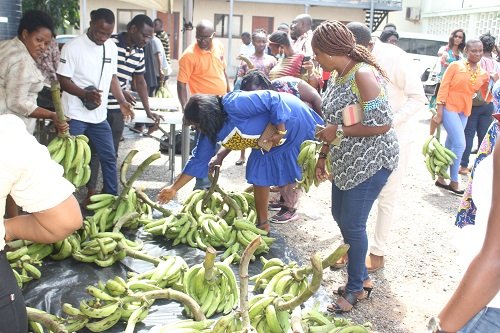Editorial
Increase in food prices: We need more sustainable measures

Some workers at the Ministry buying food stuffs
Dear Editor,
Permit me to express my thoughts on the Planting for Food and Jobs (PFJ) ‘market’ set up in Accra recently by the Ministry of Food and Agriculture. The ministry since last week had been selling foodstuff at prices patrons say were relatively cheaper than those on the open market.
This week, I heard other produce would be available at the Efua Sutherland Children’s Park. While some people have lauded the initiative others say food distribution or supply cannot be within the mandate of the agriculture ministry.
Others suggest that the Ministry’s direct sale of foodstuffs would create the impression that traders on the open market are responsible for the escalating food prices in the country.
Whatever be the argument, tough times call for drastic measures hence the decision by the ministry to go to the hinterlands to cart and supply goods to the general public.
While at it, I am yet to see any clear measures the ministry is putting in place to address the numerous challenges traders face in transporting food to their final destination, the capital Accra and elsewhere. Transportation cost, according to traders, had been a major determinant in the prices of goods.
Unlike the ministry, that has enough logistics to cart goods from the hinterlands, traders sometimes have to convey goods in transit for many days before arriving at their final destinations.
Many have said the Ministry’s approach to addressing the high cost of food prices in the country is not sustainable and I cannot agree less. Although this may bring some temporary relief, consumers wonder what will happen in the months and years ahead when this pilot arrangement is over.
Selling foodstuff at the Ministry without tackling the root causes of the general high cost of food prices in the country only amounts to window-dressing the issues. We cannot continue this way, citizens deserve better!
Franklin Kwabena Okyere,
Dodowa
Editorial
Fix broken pipes at Dansoman Mpoasei area
Dear Editor,
I am writing to draw your attention to a matter of grave concern affecting residents of Dansoman Mpoasei area.
Recently, contractors have been digging to fix some pipes but the infrastructure has been badly managed and creating inconvenience for residents.
The exercise has left several pipes broken and these damages have been left unattended, forcing households to endure disrupted water supply.
Such negligence does not only inconveniences residents but also raises serious questions about accountability and oversight in public works.
Contractors entrusted with projects of this nature must be held responsible.
It is unacceptable for them to abandon damaged utilities without repair.
Authorities should ensure that such contractors were compelled to restore any services they disrupt.
I urge the relevant agencies to take swift action to address this issue by compelling such contractors to repair the damage they cause.
Princess Wonovi
Dansoman
Editorial
Enforce child protection laws, regulations at entertainment centres
Shisha smoking is on the rise among young people who should be making significant life investments for a better future.
Shisha is a smoking apparatus designed to smoke heated tobacco to deliver a smooth and flavourful experience.
Although under the Ghanaian law, shisha smoking is prohibited for minors the law is violated as more and more minors have resorted to smoking the substance at the peril of their future.
Public health experts have consistently warned that shisha use exposes users to harmful substances that can negatively affect brain development, respiratory health, and overall well-being, particularly among young people.
As a result, concerns have been raised in Damongo in the Savannah Region following reports that some young people believed to be under the age of 18 have allegedly been found smoking shisha in pubs and drinking spots within the township.
According to eyewitnesses these minors were seen patronising nightlife venues, particularly during late evening hours, where shisha smoking was openly taking place. The situation has sparked renewed public concern over the enforcement of child protection laws and regulations governing entertainment centres in the municipality.
It is sad that the situation is becoming increasingly common and what is more dangerous is that residents fear to openly report or speak about it as they claim their lives will be at risk if they do so.
But the warning is that the rising consumption of hard drugs poses a serious threat to the future of the youth in general.
The situation is worrying and some residents believe that the alleged incidents point to broader challenges relating to youth supervision, substance abuse, and weak enforcement of existing regulations.
The youth are the future leaders of Ghana therefore we cannot sit aloof and expect them to waste their lives.
The Spectator therefore urges all hands to be on deck to find a lasting solution to this menace. We support the call by residents on municipal authorities, security agencies, and regulatory bodies to intensify monitoring of pubs and entertainment centres to ensure compliance with the law.
We applaud the Savannah Regional Minister, Mr. Salisu Be-Awurbi, who has led public education campaigns, engaged security agencies, and supported enforcement actions aimed at addressing the rising use of illicit substances in the region.
Again, we commend the Chief of Damongo, Wura Kelly Seidu Boresah I, who has also called on all stakeholders including parents, community leaders, institutions, and young people to actively support efforts to curb drug abuse.
His caution to individuals involved in the sale and distribution of illicit drugs to immediately desist from the practice, is laudable.
If strict and swift measures are taken to arrest and prosecute offenders in accordance with the law, it will deter others from engaging in it and minors will be free.
The Spectator urges the appropriate authorities to enforce child protection laws and regulations at entertainment centres to protect the youth.







